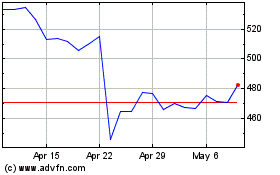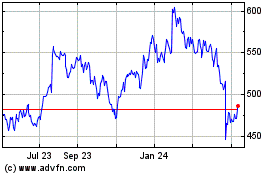Indexes to Unleash Flood of Money Into Chinese Stocks
16 May 2019 - 9:59PM
Dow Jones News
By Asjylyn Loder
Investors are about to buy billions of dollars in mainland
Chinese stocks even as trade tensions whipsaw markets.
Two of the largest global index providers, MSCI Inc. and FTSE
Russell, will soon begin ratcheting up exposure to companies listed
on China's domestic exchanges. The increases will force asset
managers to purchase shares of Chinese companies to match their
changing benchmark.
MSCI will begin raising the weight of mainland China stocks,
called "A shares," in several of its indexes later this month. It
is the first of three increases that will quadruple the weight of A
shares in the MSCI Emerging Markets Index to 3.3% by the end of the
year. The index is tracked by about $1.9 trillion in assets from
pensions, endowments, passive funds and other investors, meaning
about $50 billion in new money could be chasing China A shares from
that index alone. FTSE Russell will begin adding A shares to its
indexes next month.
As a result of the changes, investors in index mutual funds and
exchange-traded funds will soon have even more of their money
invested in China. The country is already the largest slice of both
FTSE Russell's and MSCI's emerging-markets indexes, accounting for
more than 30% of the portfolios. The exposure is being ramped up
even as the U.S. and China engage in a tit-for-tat trade battle
that has unsettled stock markets in both countries.
The expansion of index investing marks a new phase in China's
decadeslong effort to open up its markets to more foreign
investment. China earned a spot in the benchmarks after regulators
made progress at allaying concerns about market access and ease of
trading.
China A shares are yuan-denominated shares of Chinese companies
listed on mainland Chinese stock exchanges. The indexes already
included other types of Chinese shares, such as Hong Kong-listed
stocks and depositary receipts that trade in U.S. markets.
The A-shares market was opened up to investors beginning in
2003. But it was limited to qualified institutions and subject to
certain rules, including restrictions that made it hard to move
money out of China. These limitations were a concern for mutual
fund and ETF managers, who must be able to meet daily buy and sell
orders from shareholders.
"China has made a lot of concessions and developments in their
market that has made it more transparent and better regulated,"
said Luke Oliver, head of U.S. ETF capital markets for DWS Group,
the asset-management business of Deutsche Bank AG and the first to
offer an A-shares ETF.
But government intervention and limited transparency in China's
markets may limit any future expansion of A-shares investing. One
concern is caps on foreign ownership of Chinese companies, said
Joti Rana, FTSE Russell's head of governance and policy for the
Americas.
MSCI has also identified several problems that will have to be
addressed, said Chin Ping Chia, a Hong Kong-based managing director
of research with MSCI. The barriers include timing differences for
trade settlement, Hong Kong holidays that prevent overseas
investors from accessing mainland markets even when trading is
open, and the inability of non-Chinese investors to take advantage
of derivatives used to hedge their exposure, like stock-index
futures and options.
Critics say the increase of index investing in China leaves
investors increasingly vulnerable to price swings in a single,
volatile market, said Steven Schoenfeld, founder and chief
investment officer of BlueStar indexes, which focuses on Israeli
and other Middle Eastern markets. The benchmark Shanghai Composite
Index tumbled almost 25% in 2018, though it has rebounded this
year.
"When a single country is a third or more of the index, and the
top five countries are two-thirds of the index, you're giving up
the diversification benefit of a broad index, which is part of the
rationale of being in an index strategy in the first place," Mr.
Schoenfeld said.
To receive our Markets newsletter every morning in your inbox,
click here.
Vivian Salama contributed to this article.
Write to Asjylyn Loder at asjylyn.loder@wsj.com
(END) Dow Jones Newswires
May 16, 2019 07:44 ET (11:44 GMT)
Copyright (c) 2019 Dow Jones & Company, Inc.
MSCI (NYSE:MSCI)
Historical Stock Chart
From Mar 2024 to Apr 2024

MSCI (NYSE:MSCI)
Historical Stock Chart
From Apr 2023 to Apr 2024
